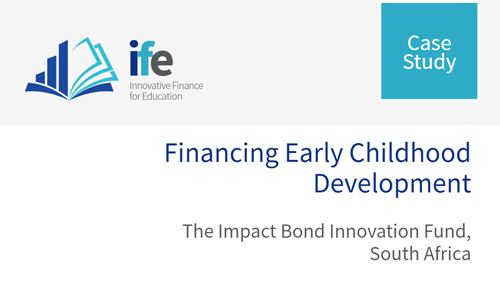Different mechanisms of innovative financing for education have been implemented in diverse contexts, with various purposes and involving many stakeholders.
The case studies here displayed explore and illustrate how these mechanisms work in practice. The cases tell the story behind the design and implementation of various mechanisms, shedding light on the financing challenges they address. The case studies fall into two different categories – short cases and in-depth case studies.
 |
 |
|
Financing Early Childhood Development: The Impact Bond Innovation Fund, South Africa This case study details the design, development, and implementation of the Impact Bond Innovation Fund in South Africa where a group of diverse partners came together to launch a social impact bond with the expectation that it could deliver more efficient and effective funding for early childhood development. |
Proyectá Tu Futuro: A Social Impact Bond for Education and Employability Training in Buenos Aires This case study discusses how the “Proyectá Tu Futuro” (PTF) Social Impact Bond (SIB) in Buenos Aires, Argentina, was developed, borrowing the SIB idea from other contexts. It analyses its achievements and challenges in aiming to simultaneously tackle low graduation rates in secondary education and unemployment among young adults. |
|
This case study showcases the process for designing and developing the India Education Outcome Fund (IEOF) of Social Finance India (SF-IND), aimed at providing sustainable and innovative funding at scale to deliver educational outcomes. |
This case study examines the evolution of Zaya Learning Labs, in India, from its initial work as a non-profit organisation to its current format as a for-profit social business. It focuses on how its funding has changed over time, leveraging the impact investing ecosystem. |
|
The Skills and Knowledge for Youth (SKY) Project This case study explores the Skills and Knowledge for Youth (SKY) project in Ethiopia, which uses results-based financing (RBF) in education to increase employability and labour market insertion of disadvantaged youth, to create more jobs (self-employment), and to empower youth in order to escape the ‘low/no skill – no job – no income’ poverty trap. |
Please contact us: